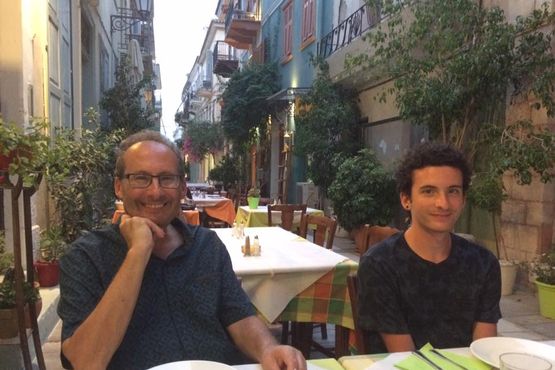Writing as a legacy

© 2018 Peter Stathopoulos / Peter and his son Nikos in Greece
FdR interviewed Peter Stathopoulos, author of Memoir of a Dead Guy, a book he started writing two years ago after he was diagnosed with ALS (Lateral Amiotrophic Lateral Sclerosis).
My primary motivation was, and is, to compile memories for my kids.
The New York Times and TwinCities published two excerts of the book. You can go to the pages by clicking the links provided by FdR.
FdR: Could you please give some background about yourself?
Peter Stathopoulos: First, Gianluca, thank you for contacting me about this. I’m 57 years old and live in Minnesota, USA. I was diagnosed with ALS 2 years ago, literally 5 days before my kids and I were scheduled to leave on vacation for Greece. (The trip was magical for more reasons than I could’ve imagined.)
I grew up in Minnesota, went to college at Yale in Connecticut where I majored in French Literature, and then spent a couple years writing songs and singing in bars in Greenwich Village, New York. I wasn’t very good at it, but that has never stopped me from doing what I enjoy.
When I moved back to Minnesota, I married and had 3 kids… John (26), Nikos (20), and his twin sister, Maria. My children are my purpose in life, and I worked in the insurance business for a couple decades to support my family. I received my ALS diagnosis shortly after I divorced and voilà!
Oddly, I’m very happy at this time in life. I’m madly in love with a woman I’ve known since I was 7 years old (Terri Hammerlund); my kids are all at great spots in life and, most important, are wonderful people; and I finally have time to write!
FdR: Why did you decide to write this book?
Peter Stathopoulos: My primary motivation was, and is, to compile memories for my kids.
FdR: Why did you call the book Memoir of a Dead Guy? You are still alive, you are still fighting.
Peter Stathopoulos: The 14-year-old boy in me thought it was a funny title and couldn’t resist. MEMOIR OF A DEAD GUY also reflects my objective of viewing my life from the inside and outside at once.
FdR: You could have made a documentary film about your story, your life and the life with your children: you choose instead to write. Are words a better legacy than any other form of language and expression?
Peter Stathopoulos: I probably look better on the page than on-screen. Using words also gives me the opportunity to continue playing with the document for as long as I breathe, which I simply enjoy.
FdR: Does nature as you describe it in your excerpts (a sunny sky the day of the diagnosys, a beautiful landscape in Greece, etc.) care about the destiny of human beeings?
Peter Stathopoulos: This is a great question! My heart believes that nature cares, while my mind is less convinced.
FdR: The way you write about Athens seems to suggest that this city cares about you.
Peter Stathopoulos: Your comment is very perceptive! Athens certainly gave me an ideal forum to explore my life in the context of Western history while sharing the exploration tangibly with my kids. So if a city can care, this one does.
FdR: Irony is so present in your excerpts. Is this a way to say: “I own my life?”.
Peter Stathopoulos: Yes, you hit the nail on the head! We create our life and our legacy anew every day. In some ways, my job is easier with ALS because I don’t have to worry about the next 30 years.
FdR: The question “Why me?” never came to your mind?
Peter Stathopoulos: You’re correct, that question never came to mind. I jokingly told my mom it was because I didn’t smoke enough pot as a kid.
FdR: What does make you write in such a powerful way?
Peter Stathopoulos: Thank you for enjoying my writing! If there is any power in my writing, I think it relates to a combination of engagement and laissez-faire that strikes a chord with some people.
(Peter Stathopoulos was interviewed by Gianluca Grossi).
Read the excerpts
The New York Times
TwinCities
The interview in Italian
Scrivere ai figli
Read the introduction
Le parole come eredità





